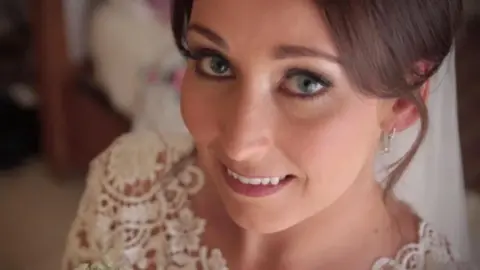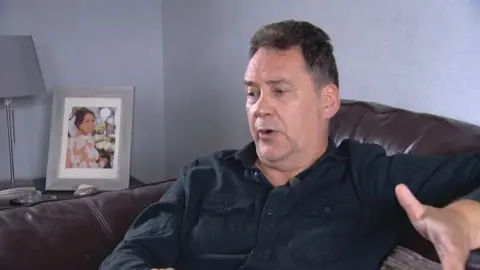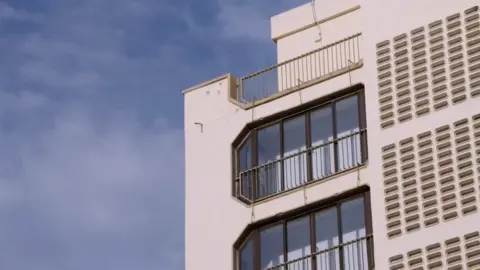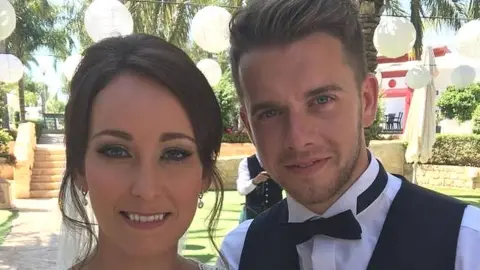Kirsty Maxwell: Balcony fall family call for Scots coroner
 Facebook
FacebookThe family of a Scottish woman who died after falling from a balcony in Benidorm four years ago are calling for Scotland to adopt a coroners system.
In England and Wales, the coroner investigates all unexpected deaths.
Kirsty Maxwell's parents said if she had been from Liverpool instead of Livingston, they would have received far more help from the authorities.
Her father Brian Curry said that instead, they were left to cope almost entirely by themselves.
He told BBC Scotland: "When Kirsty died, if we'd had the coroners system, we could have had more of an investigation here.
"We've been told that an inquest would have been mandatory. But in Scotland we don't have anything."

Kirsty was in Benidorm for a hen weekend when she died on 29 April 2017.
After their first night on the town, in the early hours of the morning, she and her friends returned to the apartment block where they were staying and went to bed.
At about 07:50, Kirsty left the apartment and went to the floor above, where some of her friends were in another flat.
She knocked on the wrong door and went into an apartment which was being used by a group of men from Nottingham.
Within minutes she had fallen to her death from their 10th floor balcony.
The police in Benidorm initially treated the case as a suspected homicide but after an investigation, the Spanish authorities ruled there was not enough evidence to show that a crime had taken place.

They said Kirsty had been disorientated and "greatly affected by the intake of alcohol".
The men from Nottingham said Kirsty's death had been a tragic accident, denied any involvement and expressed their deepest sympathy to her family.
Kirsty's family have described the Spanish investigation as shambolic. They claim crucial evidence was destroyed and important lines of inquiry ignored.
They said that when she died they received sympathetic but limited consular assistance from the Foreign Office in Benidorm.
When they returned home with her body, Police Scotland told them they were unable to get involved.
'We could have a 'go-to' person'
Mr Curry said Scottish families who lost a loved one abroad have to do everything by themselves.
He said: "The families have got to go and fight the case, the families have got to raise money, the families have got to go abroad, the families have got to find a lawyer, the families have got to go to the courts, so it's left up to the families to do everything on their own."
Had Kirsty been from England or Wales, once her body was returned home, a coroner would have taken responsibility for establishing how she died.
An inquest would have been held and an officer from the local police force would have become involved.
Mr Curry said: "If we had the coroners system, we could have had the girls who were with Kirsty interviewed, the men interviewed, we could have had a dedicated senior investigating officer, we could have had a "go-to" person."
 Facebook
FacebookA retired English coroner who lives in Fife is advising the family's legal team.
Donald Coutts-Wood told the BBC: "If it's a violent or unnatural death, the coroner must investigate and part of that investigation is an inquest. There would be a lot of witnesses. The girls, the men, and expert witnesses on how she fell and so on.
"It's not just in England and Wales. If you look round other countries, they have some form of coronial system. Australia, Canada, New Zealand. America does. Northern Ireland does.
"I did many, many inquests. It gave families some sort of ability to move on."
Six weeks after Kirsty died, a new law came into force in Scotland, allowing fatal accident inquiries to be held into the deaths of Scots abroad.
It wasn't retrospective and such FAIs would only take place at the discretion of the Lord Advocate, the head of Scotland's prosecution service.
The inquiry would be limited to establishing what lessons could be learned to prevent similar deaths in the future. In four years the new powers have not been used once.
Mr Curry said: "We need to find out what happened to Kirsty. We need answers. We just need people to be open and tell us what happened. But we need that help to get those answers."
A Scottish government spokesman said ministers had met a number of families to discuss their experiences and the difficulties they faced following the death of a loved one abroad.
He said: "While it is the role of the Foreign, Commonwealth and Development Office to provide consular support, we will continue to work alongside UK government departments and other key agencies to improve how victims and their families are supported following the death of a relative overseas."


